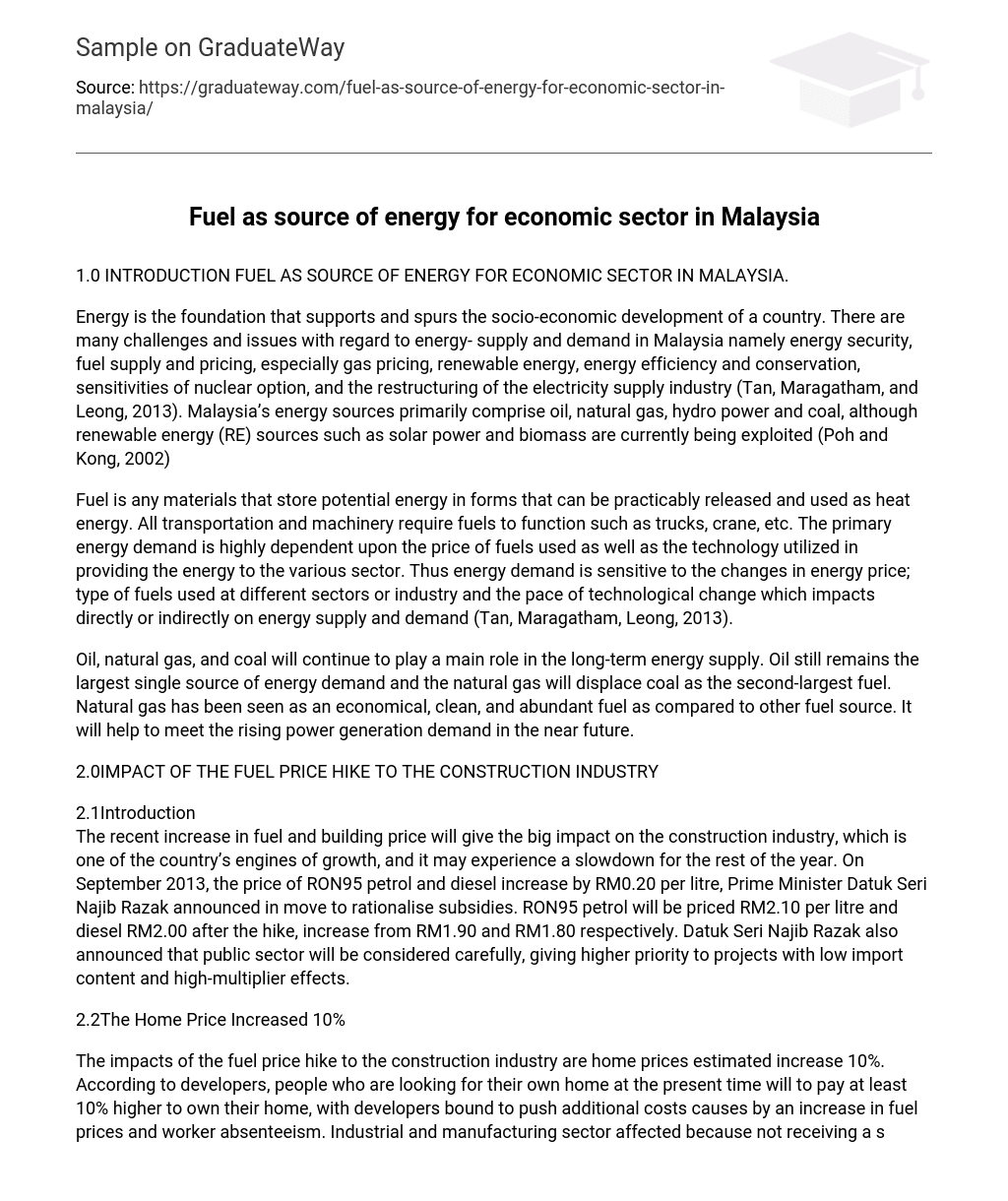FUEL AS SOURCE OF ENERGY FOR ECONOMIC SECTOR IN MALAYSIA.
Energy is the foundation that supports and spurs the socio-economic development of a country. There are many challenges and issues with regard to energy- supply and demand in Malaysia namely energy security, fuel supply and pricing, especially gas pricing, renewable energy, energy efficiency and conservation, sensitivities of nuclear option, and the restructuring of the electricity supply industry (Tan, Maragatham, and Leong, 2013). Malaysia’s energy sources primarily comprise oil, natural gas, hydropower and coal, although renewable energy (RE) sources such as solar power and biomass are currently being exploited (Poh and Kong, 2002)
Fuel is any materials that store potential energy in forms that can be practicably released and used as heat energy. All transportation and machinery require fuels to function such as trucks, crane, etc. The primary energy demand is highly dependent upon the price of fuels used as well as the technology utilized in providing the energy to the various sector. Thus energy demand is sensitive to the changes in energy price; type of fuels used at different sectors or industry and the pace of technological change which impacts directly or indirectly on energy supply and demand (Tan, Maragatham, Leong, 2013).
Oil, natural gas, and coal will continue to play a main role in the long-term energy supply. Oil still remains the largest single source of energy demand and the natural gas will displace coal as the second-largest fuel. Natural gas has been seen as an economical, clean, and abundant fuel as compared to other fuel source. It will help to meet the rising power generation demand in the near future.
2.0 IMPACT OF THE FUEL PRICE HIKE TO THE CONSTRUCTION INDUSTRY
2.1 Introduction
The recent increase in fuel and building price will give the big impact on the construction industry, which is one of the country’s engines of growth, and it may experience a slowdown for the rest of the year. On September 2013, the price of RON95 petrol and diesel increase by RM0.20 per litre, Prime Minister Datuk Seri Najib Razak announced in move to rationalise subsidies. RON95 petrol will be priced RM2.10 per litre and diesel RM2.00 after the hike, increase from RM1.90 and RM1.80 respectively. Datuk Seri Najib Razak also announced that public sector will be considered carefully, giving higher priority to projects with low import content and high-multiplier effects.
2.2The Home Price Increased 10%
The impacts of the fuel price hike to the construction industry are home prices estimated increase 10%. According to developers, people who are looking for their own home at the present time will to pay at least 10% higher to own their home, with developers bound to push additional costs causes by an increase in fuel prices and worker absenteeism. Industrial and manufacturing sector affected because not receiving a subsidies for diesel, thereby increasing the cost of transportation for the management and workers in the factory (The Star, Sep 5 2013).
2.3 The price of material, machinery, and transportation
The increase of fuel price will give impact to construction costs increase at all levels of the value chain from building material such as cement, sand, concrete and others material, these also affected both developers and contractors. The Cement Industry also feel the impact of petrol hike ,according to Cement maker Lafarge Malaysia Bhd., the increase in fuel prices would have a certain impact on the cost of its product. The increase would naturally have an effect on business in terms of transportation cost for both production and delivery to the market. In George Town, the Penang Master Builders and Building Material Dealers Association said it expected construction cost to rise by 3% to 5%.
According to Association President Datuk Lim Kai Seng, cost of transportation was likely to rise 10% to 20% and the prices of sand and cement between 5% and 10%. It also mention that the cost of cement now is RM17.50 per 50kg while sand sold for RM70.00 per cubic metre (The Star, Sep 5 2013). Prices of construction that related to material, transportation and machinery cost also increase substantially and builders are facing critical problems. A large number of trucks and heavy machinery is needed to transport the cement, sand, stone, and reinforcement from plants or factory to construction.
These rely on large amounts of diesel to operate and will surely effect the construction cost, especially for construction sites far from the factory needed more transportation to transport materials to site, these will needed more diesel for transportation. The contractors will definitely ask to re-negotiate the contract prices when the increases in the price of building material in construction because of increasing in fuel prices. The contractors are likely to ask for variation orders to cover the rise in raw material. The increasing fuel price also increase the delaying of project construction due to the rising costs of construction material also effect the construction industry.
This is because property developers are unable to fix prices for their properties due to the current uncontrollable sharp increase in building material prices. Particularly, in housing industry, it is going to be slowdown and discourage people from buying housing. The difficulties that the construction industry is facing will inevitably impact the development. However, the continuous increase in fuel the construction material price is proving to be an ordeal and it is hoped the construction will be able dealing with these challenges. The key to success lies in having a positive mind set and enhancing both efficiency and productivity in the whole construction value chain.





